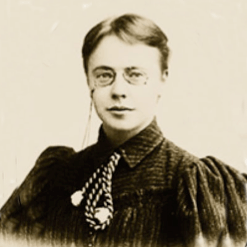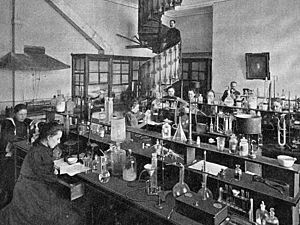Vera Yevstafievna Popova facts for kids
Vera Yevstafievna Popova, born Vera Bogdanovskaya (Russian: Вера Евстафьевна Попова; 17 September 1867 – 8 May 1896), was an important Russian chemist. She was one of the very first women in Russia to become a chemist. Vera also wrote the first chemistry textbook by a Russian woman. Sadly, she died in a laboratory accident, likely making her the first woman to die while working in chemistry.
Contents
Vera Popova's Early Life and Schooling
Vera Bogdanovskaya was born in 1867 in a city called Saint Petersburg in Russia. Her father, Evstafy Ivanovich Bogdanovsky, was a professor who taught surgery. Vera and her two siblings were taught at home by their parents.
In 1878, when she was 11 years old, Vera started studying at the Smolny Institute. After that, from 1883, she spent four years at the Bestuzhev Courses. These courses were special because they helped Russian women study in their own country.
After the Bestuzhev Courses, Vera worked for two years in laboratories. These were at the Academy of Sciences and the Military Surgical Academy.
Studying Chemistry in Switzerland
In 1889, Vera Bogdanovskaya left Russia and went to Switzerland. There, she studied for her doctorate degree in chemistry at the University of Geneva. She finished her research in 1892. Her main work was on a chemical called dibenzyl ketone.
Vera had wanted to study a different chemical, H-C≡P (which is called methylidynephosphane). But her professor, Carl Gräbe, convinced her to focus on dibenzyl ketone instead. She also worked with Dr. Philippe A. Guye, who was studying stereochemistry. Stereochemistry is about how atoms are arranged in 3D space.
Vera Popova's Career as a Chemist
After finishing her studies, Vera Bogdanovskaya returned to Saint Petersburg in 1892. She started teaching chemistry at the Bestuzhev Courses. This was the same place she had studied before. She worked as an assistant to Professor L'vov. She helped teach the first classes on stereochemistry there.
Vera was known as a great teacher. She also knew a lot about how to teach chemistry. Because of this, she wrote her first book, which was a textbook about basic chemistry. She also wrote reviews of other works and translated important chemistry papers. She even helped publish the works of a famous chemist named Alexander Butlerov, who had passed away. Between 1891 and 1894, she published several papers based on her doctoral research.
Beyond Chemistry
Vera Popova was not only a chemist. She had many other interests too! She was interested in entomology, which is the study of insects. She also enjoyed writing and learning different languages. In 1889, she wrote about her work with bees. Vera also wrote her own short stories. She even translated short stories by a French writer named Guy de Maupassant.
Vera Popova's Personal Life
In 1895, Vera Bogdanovskaya left Saint Petersburg and married General Jacob Kozmich Popov. He was older than her and was in charge of a military steel factory. Vera asked him to build her a laboratory so she could keep doing her chemistry experiments.
They lived in a town called Izhevskii Zavod. This town was controlled by the military and was focused on making weapons. Some people think that her marriage might have been a "marriage of convenience." This means that sometimes women in Russia would marry just to have more freedom from society's rules.
Vera Popova's Death
Vera Popova died on 8 May 1896. She was only 28 years old. Her death happened because of an explosion in her laboratory. At the time, she was trying to create a chemical called H-C≡P (methylidynephosphane). This chemical is similar to hydrogen cyanide, which is very dangerous.
About the Chemical She Was Making
The chemical H-C≡P, which Vera was trying to make when she died, was not successfully created until 1961. It is a very dangerous chemical. It can catch fire easily and burns on its own even at low temperatures when it touches air.
Vera Popova's Legacy
After Vera Popova's death, many people remembered her contributions. The Journal of the Russian Physical Chemical Society wrote a long tribute about her. A shorter notice about her appeared in the famous science journal Nature. The American journal Science also mentioned her.
Vera was a kind woman who died too soon. Her husband created a special fund in her memory. This fund was set up to help other female students who wanted to study. Her picture was also displayed at the Women's College where she had studied.
Vera Popova is also remembered for her work on classifying dibenzyl ketone. Her research helped lay the groundwork for creating synthetic acrylic resins. These resins are used in many things, like plastics, and are made from acetone cyanohydrin.
See also
 In Spanish: Vera Popova para niños
In Spanish: Vera Popova para niños
 | Selma Burke |
 | Pauline Powell Burns |
 | Frederick J. Brown |
 | Robert Blackburn |



